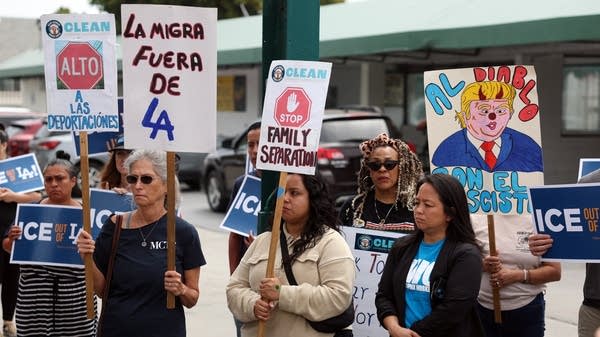The Tijuana businesses employing U.S. deportees
When Donald Trump took office in January, he promised mass deportations and a crackdown on immigration.

This story was produced by our colleagues at the BBC.
Over a steady hum of activity, operators at the EZ Call Center in Tijuana work through long lists of U.S. phone numbers. All the agents speak fluent English, and the people at the other end of the line are largely none the wiser that they're talking to agents in Mexico rather than the U.S.
In fact, virtually every phone operator in the company is a migrant who has been deported from the United States, including EZ Call Center’s owner Daniel Ruiz.
“We all are dealing with culture shock,” he said. “We have all of our life over there, went to school over there, watch TV over there, you know, brought up on American culture, and we have family over there.”
Born in Mexico, he grew up in the United States before he was deported for a low-level drug crime in his early 20s. Today, he runs the successful telesales company and co-founded a humanitarian organization called the Borderline Crisis Center.
The latest U.S. returnee at the company is Alberto Salagan, who was deported to Tijuana in January.
“I just pretty much landed here by myself — no family, no nothing, no food, no clothes — so I had to do something to get back on my feet,” he said. “And thanks to the call center, I have a job.”
The San Ysidro border crossing is one of the busiest international border crossings in the world. For so many deported migrants, being returned to Tijuana — the United States still visible on the other side of the border — is a harrowing experience. Some haven't lived in this country since they were children or babies.
Nevertheless, some companies have found distinct advantages to employing deportees as staff members. One company, the American Survey Company, or ASC, stands out.
It's one thing for a small venture like EZ Call Center to rely on deported migrants, but ASC and its sister company Voxcentrix have some 550 call center stations in Tijuana.
Nora Diaz is the Chief Happiness Officer at the company. “Whatever happened in the U.S. stays in the U.S.,” she said. “We understand that everybody has a past. We just need people who speak good English, good Spanish, and they're willing to learn and commit to a job.”
So far, the Trump administration's threat of mass deportation remains exactly that — a threat — but it has become a powerful tool in dissuading migrants from even attempting to cross into the U.S. from Mexico.













